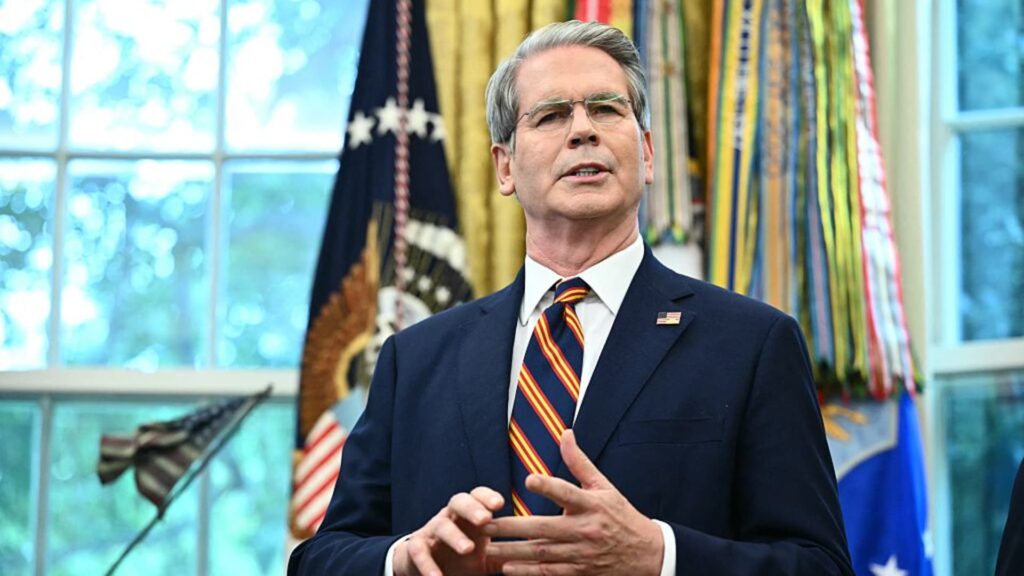
This is CNBC’s Morning Squawk newsletter. Subscribe here to receive future editions in your inbox.
Here are five key things investors need to know to start the trading day:
1. Help wanted
Last week’s salvo of job market data was weaker-than-expected across the board. While that raised some investors’ hopes for a forthcoming interest rate cut from the Federal Reserve, it also bolstered fears about the health of the economy.
Here’s what to know:
2. Paying the bills
US Secretary of the Treasury Scott Bessent speaks as US President Donald Trump signs executive orders in the Oval Office of the White House in Washington, DC on September 5, 2025.
Mandel Ngan | Afp | Getty Images
The U.S. government could soon be asking a timeless question: How would you like your refund?
In a Sunday interview with NBC’s “Meet the Press,” Treasury Secretary Scott Bessent warned that if President Donald Trump’s tariffs are struck down, the U.S. government could have to issue refunds on some of the duties that have already been collected. That “would be terrible for the Treasury,” he said. Still, Bessent said he’s “confident” that the Supreme Court will side with the White House and reverse an appeals court’s decision that ruled many of Trump’s tariffs illegal.
The Trump administration also doesn’t seem ready to throw in the towel, even if the Supreme Court rules against its tariff plan. Over the weekend, National Economic Council Director Kevin Hassett floated other potential avenues through which Trump could implement his broad duties.
3. Kenvue’s headache
Tylenol is displayed for sale behind a locked anti-theft barrier at a pharmacy in Washington, D.C., U.S., September 5, 2025.
Jonathan Ernst | Reuters
Shares of Tylenol maker Kenvue tumbled more than 9% on Friday after a report that Health and Human Services Secretary Robert F. Kennedy Jr. will link autism with Tylenol use by pregnant women. The drop was the stock’s worst session on record since being spun off by Johnson & Johnson in 2023.
Kenvue said it believes “there is no causal link” between the widely-used medication and autism. Shares regained about 1% in premarket trading this morning.
4. Something borrowed
A sign is posted in front of a home for sale on Aug. 27, 2025 in San Francisco, California.
Justin Sullivan | Getty Images
Aspiring home owners got some welcome news last week.
The average 30-year fixed mortgage rate dropped 16 basis points to 6.29% following Friday’s jobs report, according to Mortgage News Daily. That’s the largest one-day decline since August 2024.
With that slide, the rate sat at its lowest level since last October. Friday’s decline also helped the rate drop below the high 6% range that it has clung to for several months, CNBC’s Diana Olick reported.
5. Hollywood’s call of duty
Regulators have raised concerns that Microsoft could block the hit Call of Duty franchise from being released on rivals’ games consoles. Microsoft said it has offered Sony a 10-year contract for Call of Duty to be released on the PlayStation on the same day it comes to the Xbox. The U.S. giant is trying to assuage regulators’ and competitors’ fears.
Michael Ciaglo | Bloomberg | Getty Images
Video games are getting upgraded to the silver screen.
CNBC’s Sarah Whitten reported on the burgeoning trend of studios developing gaming franchises into TV series and movies. For two examples, just look at “A Minecraft Movie” from Warner Bros. and HBO’s “The Last of Us.”
The latest development in the console-to-cinema trend came last week, when Paramount announced plans for a live-action film tied to Activision’s Call of Duty. Some might say it’s about time: Call of Duty — or COD to fans — has been the best-selling video game franchise in the U.S. for 16 years straight.
The Daily Dividend
A data revision showed the U.S. labor force contracted in June, something that hasn’t happened in more than four years. This graph shows just how on unusual that monthly decline has been in recent history:
— CNBC’s Sean Conlon, Brian Evans, Jessica Dickler, Ari Levy, Annika Kim Constantino, Diana Olick, Sarah Whitten and Gabriel Cortes contributed to this report. Josephine Rozzelle edited this edition.

